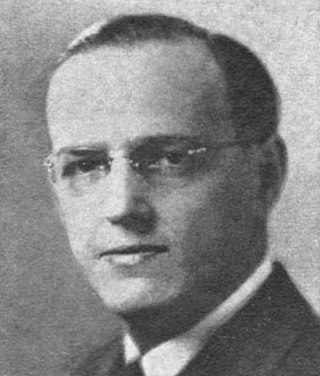Conservatism is a cultural, social, and political philosophy and ideology, which seeks to promote and preserve traditional institutions, customs, and values. The central tenets of conservatism may vary in relation to the culture and civilization in which it appears. In Western culture, depending on the particular nation, conservatives seek to promote a range of institutions, such as the nuclear family, organized religion, the military, the nation-state, property rights, rule of law, aristocracy, and monarchy. Conservatives tend to favour institutions and practices that enhance social order and historical continuity.
The Conservative Party is a name used by many political parties around the world. These political parties are generally right-wing though their exact ideologies can range from center-right to far-right.
Paleoconservatism is a political philosophy and strain of conservatism in the United States stressing American nationalism, Christian ethics, regionalism, traditionalist conservatism, and non-interventionism. Paleoconservatism's concerns overlap with those of the Old Right that opposed the New Deal in the 1930s and 1940s as well as with paleolibertarianism and right-wing populism. By the start of the 21st century, the movement had begun to focus more on issues of race.
Social conservatism is a political philosophy and a variety of conservatism which places emphasis on traditional power structures over social pluralism. Social conservatives organize in favor of duty, traditional values and social institutions, such as traditional family structures, gender roles, sexual relations, national patriotism, and religious traditions. Social conservatism is usually skeptical of social change, instead tending to support the status quo concerning social issues.

The John Birch Society (JBS) is an American right-wing political advocacy group. Founded in 1958, it is anti-communist, supports social conservatism, and is associated with ultraconservative, radical right, far-right, right-wing populist, and right-wing libertarian ideas. Originally based in Belmont, Massachusetts, the JBS is now headquartered in Grand Chute, Wisconsin, with local chapters throughout the United States. It owns American Opinion Publishing, Inc., which publishes the magazine The New American, and it is affiliated with an online school called FreedomProject Academy.
Compassionate conservatism is an American political philosophy that stresses using conservative techniques and concepts in order to improve the general welfare of society. The philosophy supports the implementation of policies designed to help the disadvantaged and alleviate poverty through the free market, envisaging a triangular relationship between government, charities and faith-based organizations. The term entered mainstream parlance between 2001 and 2009, during the administration of US President George W. Bush. He used the term often to describe his personal views and embody some parts of his administration's agenda and policy approach.
Liberal conservatism is a political ideology combining conservative policies with liberal stances, especially on economic issues but also on social and ethical matters, representing a brand of political conservatism strongly influenced by liberalism.
Cultural conservatism is described as the protection of the cultural heritage of a nation state, or of a culture not defined by state boundaries. It is sometimes associated with criticism of multiculturalism, anti-immigration sentiment, and opposition to illegal immigration. Because their cultural preservationist objectives are in conflict with those of anti-racists, cultural conservatives are often accused of racism. Despite this, however, cultural conservatism can be more nuanced in its approach to minority languages and cultures; it is sometimes focused upon heritage language learning or threatened language revitalization, such as of the distinctive local dialect of French in Quebec, Acadian French, Canadian Gaelic, and the Mi'kmaq language in Nova Scotia and New Brunswick, or the Irish language in Newfoundland. Other times cultural conservatism is more focused upon the preservation of an ethnic minority's endangered ancestral culture, such as those of Native Americans.

Sir Roger Vernon Scruton, was an English philosopher, writer, and social critic who specialised in aesthetics and political philosophy, particularly in the furtherance of traditionalist conservative views.
Conservatism in the United States is based on a belief in limited government, individualism, traditionalism, republicanism, and limited federal governmental power in relation to U.S. states. Conservative and Christian media organizations and American conservative figures are influential, and American conservatism is a large and mainstream ideology in the Republican Party and nation. As of 2021, 36 percent of Americans consider themselves conservative, according to polling by Gallup, Inc.
National conservatism is a nationalist variant of conservatism that concentrates on upholding national, cultural identity, communitarianism, and the public role of religion. It shares aspects of traditionalist conservatism and social conservatism, while departing from economic liberalism and libertarianism, as well as taking a more agnostic approach to regulatory economics and protectionism. National conservatives usually combine conservatism with nationalist stances, emphasizing cultural conservatism, family values and opposition to illegal immigration or opposition to immigration per se. National conservative parties often have roots in environments with a rural, traditionalist or peripheral basis, contrasting with the more urban support base of liberal conservative parties.

Walter Henry Judd, also known as I-te Chou, was an American politician and physician, best known for his battle in Congress (1943–63) to define the conservative position on China as all-out support for the Nationalists under Chiang Kai-shek and opposition to the Communists under Mao Zedong. After the Nationalists fled to Formosa (Taiwan) in 1949, Judd redoubled his support.
Conservatism in North America is a political philosophy that varies in form, depending on the country and the region, but that has similar themes and goals. Academic study into the differences and similarities between conservatism in North American countries has been undertaken on numerous occasions. Reginald Bibby has asserted that the primary reason that conservatism has been so strong and enduring throughout North America is because of the propagation of religious values from generation to generation. This connection is strongest in mainstream Protestantism in the United States, and both Protestantism and Roman Catholicism in Canada.

Libertarian conservatism, also referred to as conservative libertarianism and conservatarianism, is a political and social philosophy that combines conservatism and libertarianism, representing the libertarian wing of conservatism and vice versa.

The Kuomintang (KMT) is a Chinese political party that ruled mainland China from 1927 to 1949 prior to its relocation to Taiwan as a result of the Chinese Civil War. The name of the party translates as "China's National People's Party" and was historically referred to as the Chinese Nationalists. The Party was initially founded on 23 August 1912, by Sun Yat-sen but dissolved in November 1913. It reformed on October 10, 1919, again led by Sun Yat-sen, and became the ruling party in China. After Sun's death, the party was dominated from 1927 to 1975 by Chiang Kai-shek. After the KMT lost the civil war with the Chinese Communist Party in 1949, the party retreated to Taiwan and remains a major political party of the Republic of China based in Taiwan.
Neoconservatism in the United States is an ideological political movement.
The following outline is provided as an overview of and topical guide to politics and political science:

Neoauthoritarianism, also known as Chinese Neoconservativism or New Conservatism since the 1990s, is a current of political thought within the People's Republic of China (PRC), and to some extent the Chinese Communist Party (CCP), that advocates a powerful state to facilitate market reforms. It has been described as classically conservative even if elaborated in self-proclaimed "Marxist" theory.

Chiangism, also known as the Political Philosophy of Chiang Kai-shek, or Chiang Kai-shek Thought, is the political philosophy of President Generalissimo Chiang Kai-shek, who used it during his rule in China under the Kuomintang on both the mainland and Taiwan. It is a right-wing authoritarian nationalist political ideology which is based on mostly Confucian and Tridemist ideologies, and was used in the New Life Movement in China and the Chinese Cultural Renaissance movement in Taiwan. It is a syncretic mix of many political ideologies, including revolutionary nationalism, Tridemism, socialism, militarism, Confucianism, state capitalism, constitutionalism, fascism, authoritarian capitalism, and paternalistic conservatism, as well as Chiang's Methodist Christian beliefs.






